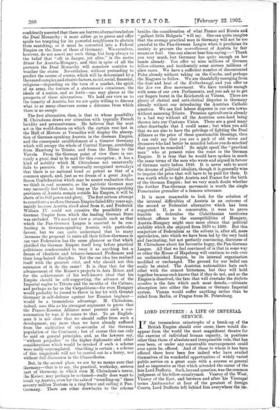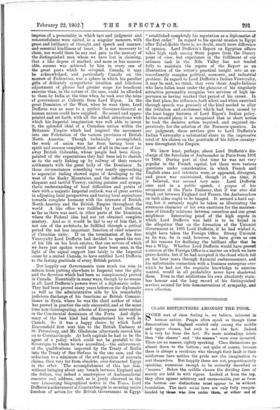LORD DUFFERIN : A LIFE OF IMPERIAL SERVICE.
IF the tremendous catastrophe of a break-up of the British Empire should ever occur, there would dis- appear from the world the most magnificent theatre for the exercise of individual human capacity, in positions other than those of absolute and irresponsible rule, that has ever been, or under any conceivable rearrangement could ever again be, offered. And of those to whom it has been offered there have been few indeed who have availed themselves of its wonderful opportunities of widely varied public service on a great scale with a success so general and so impressive as that which attended the career of the late Lord Dufferin. Such, beyond question, was the common judgment of his fellow-countrymen. Viceroy of the West, Viceroy of the East, and between and after his Viceregal terms Ambassador at four of the greatest of foreign Courts, Lord Dufferin left behind him everywhere the . _ impress of a personality in which tact and judgment and resourcefulness were united, in a singular measure, with grace and brilliancy of thought and speech and manner, and essential kindliness of heart. It is not necessary to claim, nor would there be any real gain to the memory of the distinguished man whom we have lost in claiming, that a like degree of marked, and more or less measur- able, success was achieved by him in every one of the great posts which he occupied. Canada, it may be acknowledged, and particularly Canada on the morrow of Federation, was a sphere in which his peculiar gifts of delicately sympathetic intuition and felicitous adjustment of phrase had greater scope for beneficent exercise than, in the nature of the case, could be afforded to them by India at the time when he took over the reins of government at Calcutta from Lord Ripon. In the great Dominion of the West, when he went there, Lord Dufferin was as near to a perfect Governor-General as human nature could have supplied. He seized and appro- priated. and set forth, with all the added attractions with which his Imperial imagination was well able to invest it, the splendid ideal of a Canadian nation within the Britannic Empire which had inspired the movement into one Federation of the various provinces of British North America. Though technically accomplished, the work of union was far from having been in spirit and essence completed, least of all in the case of far- away British Columbia, whose people had been disap- pointed of the expectations they had been led to cherish as to the early linking up by railway of their remote settlements with the great body of the Dominion. In those circumstances something very nearly approaching to separatist feeling showed signs of developing to the west of the Rocky Mountains, and the influence of the eloquent and tactful Viceroy, uniting genuine and sympa- thetic understanding of local difficulties and points of view with a majestic Imperial outlook, was of great service in adjusting local perspectives and tuning local aspirations towards complete harmony with the interests of British North America and the British Empire throughout the world. A like office was fulfilled by Lord Dufferin, so far as there was need, in other parts of the Dominion where the Federal idea had not yet obtained complete mastery. And so it would be fair to say of him that, if not one of the architects, he fulfilled through a critical period the not less important function of chief cementer of Canadian unity. If on the termination of his first Viceroyalty Lord Dufferin had decided to spend the rest of his life on his Irish estates, that one service of which we have just spoken would now have been seen, in the light of the signal support lent lately to the Imperial cause by a united Canada, to have entitled Lord Dufferin to the lasting gratitude of every British patriot.
• But happily our Governments were much too wise to refrain from putting elsewhere to Imperial uses the gifts and the devotion which had been so conspicuously proved in Canada. Essentially in many ways, though by no means in all, Lord Dufferin's powers were of a. diplomatic order. They had been proved many years before on the diplomatic as well as the administrative side by his remarkably judicious discharge of his functions as British Commis- sioner in Syria, where he was the chief author of what has proved in practice the only successful, and. at the same time non-disintegrating, scheme of European intervention in the Continental dominions of the Porte. And diplo- macy of the best Lind had characterised his work in Canada. So it was a happy choice by which Lord Beaconsfield first sent him to the British Embassy at St. Petersburg, and Mr. Gladstone afterwards moved him on to Constantinople. At both capitals he had to be the agent of a policy which could not be grateful to the Sovereigns to whom he was accredited,—the enforcement of the qualifications imported by the Treaty of Berlin into the Treaty of San Stefano in the one case, and the reduction to a minimum of the evil operation of suzerain claims, then very far from obsolete, over distracted Egypt in the other. The accomplishment of this last feat, without bringing about any breach between England and the Sultan, was indeed a masterpiece of Ambassadorial resource and address, and, as is justly observed in the very interesting biographical notice in the Times, Lord Dufferin's achievement at Constantinople in securing entire freedom of action for the British Government in Egypt "established completely his reputation as a diplomatist of the first order." In regard to his special mission to Egypt after Tel-el-Sebir there is, no doubt, much more difference of opinion. Lord Dufferin's Report on Egyptian affairs takes high rank among State papers from the literary point of view, but experience in the fulfilment of our arduous task in the Nile Valley has not tended fully to maintain the repute of the Report as an illustration of the writer's practical insight into an ex- traordinarily complex political, economic, and industrial problem. In regard to Lord Dufferin's Indian. Viceroyalty, it may be said, we think, that even those Anglo-Indians who have fallen least under the glamour of his singularly attractive personality recognise two services of high im- portance as having marked that period of his career. In the first place, his influence, both silent and when exercised through speech, was precisely of the kind needed to allay the irritation and excitement which had been caused by the least happy features of Lord Ripon's Indian policy. In the second place, it is recognised that at short notice he took the decisive action required, and, required im- peratively, for the solution of the Burmese question. In our judgment, these services give to Lord Dufferin's Indian Viceroyalty a substantial share in the impressive total of his claims on the gratitude of his fellow-country- men throughout the Empire.
We blow least, perhaps, about Lord Thifferin's die. charge of the functions of Ambassador in Paris from 1891 to 1896. During part of that time he was not very popular in the French capital, but there were various questions under consideration in which French and English aims and interests were, or appeared, divergent, and peace was maintained, though at one time, it is believed, war seemed very near. Lord Dufferin once said in a public speech, a propos of his occupation of the Paris Embassy, that if war ever did break out between England and France, the Ambassadors on both sides ought to be hanged. It seemed a hard say- ing, but it certainly might be taken as illustrating the strenuous character of his own exertions for the mainten- ance of friendly relations between ourselves and our great neighbour. Interesting proof of the high repute in which Lord Dufferin was held is to be found in the allegation that on the formation of the Unionist Government in 1895 Lord Dufferin, if he had wished it, might have taken the Foreign Office. Strong Unionist as he was, he is said, however, to have given as one of his reasons for declining the brilliant offer that he was a Whig. Whether Lord Dufferin would have proved a success at the Foreign Office is a matter on which we have grave doubts, but if he had accepted it the cloud which fell on his later years through financial embarrassnient, and his unfortunate connection with a business enterprise over which he had not the requisite knowledge to exercise control, would in all probability never have shadowed. them. Even in that misfortune his own absolutely stain- less honour and the long record of his distinguished services secured for him demonstrations of sympathy, and even affection.











































 Previous page
Previous page